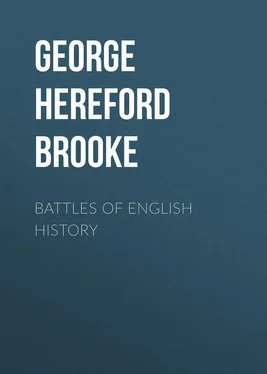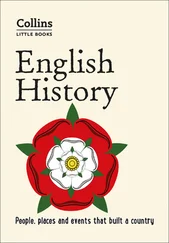Hereford George - Battles of English History
Здесь есть возможность читать онлайн «Hereford George - Battles of English History» — ознакомительный отрывок электронной книги совершенно бесплатно, а после прочтения отрывка купить полную версию. В некоторых случаях можно слушать аудио, скачать через торрент в формате fb2 и присутствует краткое содержание. Жанр: foreign_antique, foreign_prose, на английском языке. Описание произведения, (предисловие) а так же отзывы посетителей доступны на портале библиотеки ЛибКат.
- Название:Battles of English History
- Автор:
- Жанр:
- Год:неизвестен
- ISBN:нет данных
- Рейтинг книги:5 / 5. Голосов: 1
-
Избранное:Добавить в избранное
- Отзывы:
-
Ваша оценка:
- 100
- 1
- 2
- 3
- 4
- 5
Battles of English History: краткое содержание, описание и аннотация
Предлагаем к чтению аннотацию, описание, краткое содержание или предисловие (зависит от того, что написал сам автор книги «Battles of English History»). Если вы не нашли необходимую информацию о книге — напишите в комментариях, мы постараемся отыскать её.
Battles of English History — читать онлайн ознакомительный отрывок
Ниже представлен текст книги, разбитый по страницам. Система сохранения места последней прочитанной страницы, позволяет с удобством читать онлайн бесплатно книгу «Battles of English History», без необходимости каждый раз заново искать на чём Вы остановились. Поставьте закладку, и сможете в любой момент перейти на страницу, на которой закончили чтение.
Интервал:
Закладка:
Not far on the east side of this little depression was the Black Prince's position. His front was covered by a hedge with a ditch in front: Baker expressly mentions a sepes subterfossata , and it was the usual custom in Poitou to fence in this way. Behind it was a space partly planted with vines, but by no means clear of bushes, on which the English encamped. The hedge was apparently on rather lower ground, for the French knights sent to reconnoitre were able to bring back a pretty accurate report of the position and numbers of the enemy. Somewhere in this hedge was a gap left for carts to reach the upper level, the hedge apparently curving up to it so as to form a sort of funnel-shaped opening. There is now no long hedge anywhere east of the wood of Nouaillé, half a mile to the south-eastwards; but hedges and ditches disappear easily in a fertile soil under continuous cultivation. It is most probable, though it cannot be said to be certainly known, that the Black Prince's hedge ran from very near La Cardinerie towards the hamlet of Les Bordes, and that through the gap passed the road to the Gué de l'Homme.
On the morning of Sunday September 18, king John, according to Froissart, sent some knights to reconnoitre the English position, which he proposed to attack at once. On hearing their report, the king, we are told, asked them in what way the attack should be made; and Eustace de Ribeaumont, their chief, advised the king to make all his men-at-arms dismount, except a few who were to charge and break the English archers. According to Baker of Swinbrook the advice was given by a Douglas, who had fought many times against the English, and affirmed that the English always dismounted their men-at-arms, ever since their defeat at Bannockburn. Whoever gave the advice, it was suicidal folly. A little learning is proverbially a dangerous thing; probably the most dangerous form which a little learning can assume is to know a fact, and to draw utterly baseless and absurd inferences from it. Edward II. was not routed at Bannockburn because his men-at-arms fought on horseback, but because they attacked in a confused and tumultuous manner on ground too narrow for their numbers. Edward III. did not win Crecy merely because his men-at-arms fought on foot, but because he had learned, alike from the victory of Falkirk and from the defeat of Bannockburn, how to combine the destroying force of archers with the defensive firmness of spearmen on foot. Moreover the difference between offensive and defensive tactics is fundamental. Horsemen obviously by dismounting lose most of their momentum for attack; as obviously, they cannot in any other way stand firm to sustain a charge. Want of numbers compelled the English, at Crecy and at Poitiers alike, to stand on the defensive: therefore, and therefore only, their men-at-arms abandoned their natural mode of fighting.
Reminiscences of Crecy may well have inclined king John to try whether some other tactics would not succeed better than the tumultuous rush of mailed horsemen straight on a front better protected than at Crecy: but the choice he made, whether inspired by sheer stupidity, or dictated by the insane class pride which refused to see in the plebeian archers the real victors over noble knights, was the worst possible. With his overwhelming numbers he could have surrounded the English; he could have kept them fully occupied in resisting attack while detaching a superior force to cut their retreat; he could have done anything he pleased. His defeat was even more crushing than his father's, and was all the more discreditable, in that it was due to his own deliberate orders, and not to the undisciplined rush of nobles too vain-glorious to obey.
Before the battle could begin, however, the cardinal of Perigord begged John to let him try to arrange terms with the Black Prince. There was some division on the subject in the French councils, some of the king's advisers thinking that the English could not escape destruction, and that therefore any concession was folly. The king ultimately consented, and the whole day was spent by the cardinal in going to and fro between the two camps. The accounts vary as to the exact course of these negotiations: very possibly several offers and counter offers were exchanged. The king, if he thought his enemies in his power, may reasonably have proposed very severe terms as the price of their lives; the prince was apparently ready to concede a good deal; but all the efforts of the cardinal were unavailing to bring about an agreement. Whatever the terms finally offered by the king of France may have been, they were such as the prince felt he could not honourably accept, while an appeal to the arbitrament of battle was still open. The delay enabled the English to improve their defences, probably by intrenching on their right flank and rear, which had been protected on their first taking up the position by a lager of waggons. It was injurious in another way, as they were very short of food; but this mattered little, as the morrow must bring victory or destruction.
Down to the morning of September 19, the day of the battle, every detail can be determined, if not with certainty, yet with reasonable probability. At this point, however, we encounter very serious difficulties. The two authorities which describe the battle minutely, Froissart and Baker, differ from one another in points too important to be called details, though they agree in representing the Black Prince as having remained in his position. The Chandos Herald, whose testimony is primâ facie deserving of the highest respect, affirms that the prince had in the night made up his mind to retreat, that he had sent off his vanguard to convey the baggage across the stream, and would have followed with his whole army, had not the French made haste to attack the rear-guard. The discrepancy is obviously fundamental; 29 29 The Chandos Herald was in the service of Sir John Chandos, one of the Black Prince's best officers. The herald was not apparently present, but he obviously must have had every means of knowing about the battle, in which Sir John fought; he did not, however, publish his rhymed narrative till some thirty years later. Froissart, who was nineteen years old in 1356, devoted his whole life to the work of his history; he was familiar with courts, if not with camps, indefatigable in acquiring information, but not critical. He too had ample opportunities of learning all about the battle of Poitiers, at any rate from the English side. The manuscripts of Froissart, however, vary greatly, which casts a certain doubt over the trustworthiness of such details as are not given identically in all. Baker was a clerk of Swinbrook in Oxfordshire: the last words of his chronicle were written before the peace of Bretigny in 1360, so that he was even more strictly contemporary than Froissart. Several passages in his history, in which he makes very definite statements about the tactics of the long-bow, prove that he, or his informant, understood military matters well. None of them can have seen the ground, and therefore no stress need be laid on minor inaccuracies of description. Mistakes about the names of actors in the drama might easily be made: all that can be said is that the writer who has made fewest errors has a slightly better claim to general credibility. None of them can be deemed likely to have deliberately misrepresented, or to have been totally misinformed about the ground-work of the whole story. Yet there is the fact, that their narratives are substantially contradictory. Critical ingenuity may no doubt patch up some sort of superficial reconciliation between them, but it can only be superficial. Under these conditions I have no alternative but to follow the narrative which seems to be most in accordance with the known facts. I am not ignorant of the difficulties involved in this course, but my plan does not admit of a full discussion of every point that might be raised. On the whole I incline to discard the Chandos Herald, the more so because none of the less detailed narratives support him, and as between Froissart and Baker, to prefer the latter. My account of the actual battle will therefore follow the chronicle of Baker of Swinbrook, in all matters in which he and Froissart are completely at variance.
one side or the other must start from a total misconception, and if so, it is hardly worth while to speculate as to what rags of truth may be left in the narrative.
Интервал:
Закладка:
Похожие книги на «Battles of English History»
Представляем Вашему вниманию похожие книги на «Battles of English History» списком для выбора. Мы отобрали схожую по названию и смыслу литературу в надежде предоставить читателям больше вариантов отыскать новые, интересные, ещё непрочитанные произведения.
Обсуждение, отзывы о книге «Battles of English History» и просто собственные мнения читателей. Оставьте ваши комментарии, напишите, что Вы думаете о произведении, его смысле или главных героях. Укажите что конкретно понравилось, а что нет, и почему Вы так считаете.












